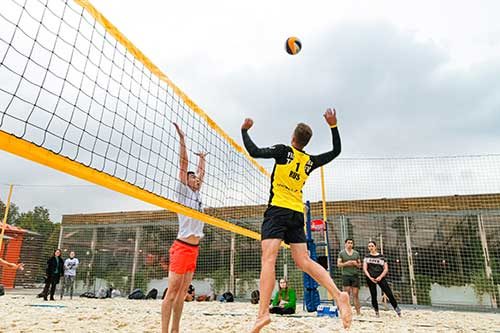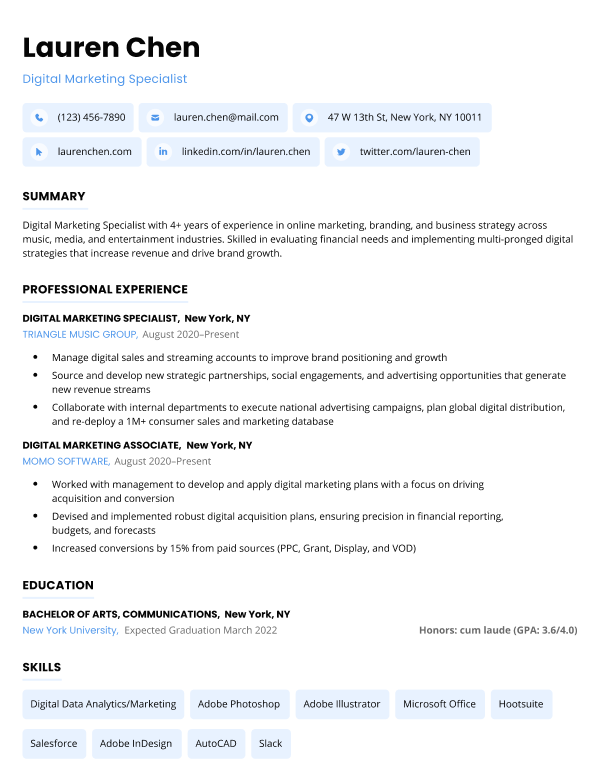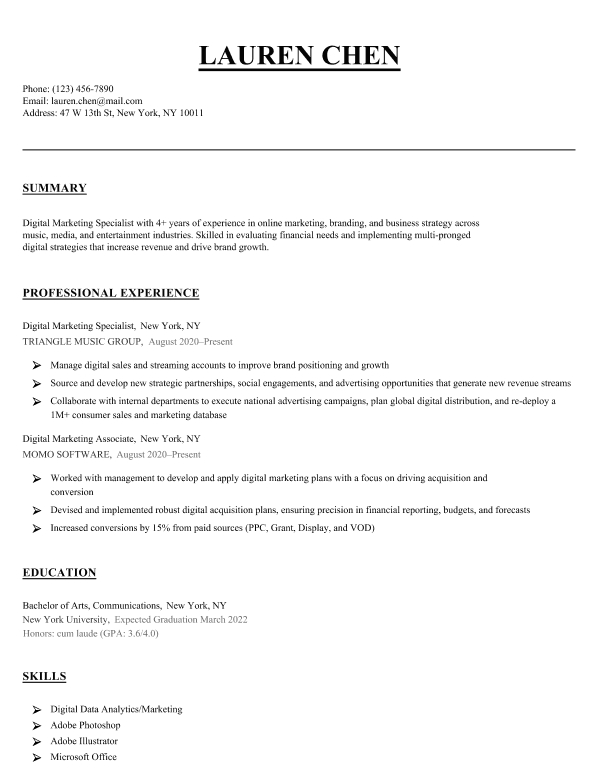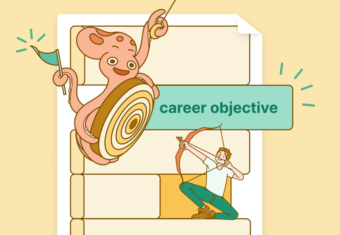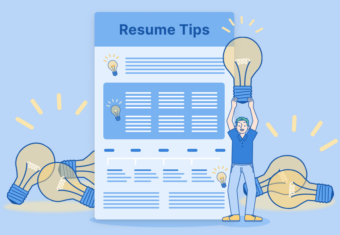Curious how you can include your top extracurricular activities, hobbies, and interests on your resume? In the video below, our resident career expert, Eva, explains how listing your favorite activities can purposefully boost your resume and showcase your skills:
Should I include extracurricular activities on my resume?
Yes, you should include extracurricular activities when writing your resume if you’re a young job seeker who lacks relevant work experience. Especially if you were active in school, rounding out your resume with activities that showcase your skills is a great way to prove you’re more capable than your lack of experience suggests.
Below, we highlight 10 of the best extracurricular activities to put on your resume. But first, check out this list of helpful resources and then choose a resume template tailored to job seekers looking to apply for entry-level positions:
Student & entry-level resume writing tips
Our free-to-use resume builder can make you a resume in as little as 5 minutes. Just pick the template you want, and our software will format everything for you.
Good extracurricular activities in a resume: 10 examples
Extracurricular activities can strengthen your resume if they’re relevant to the job, and make you a more interesting candidate even if they’re not.
Here are 10 of the best extracurricular activities you can put on your resume in 2024 to improve your chances of getting a job:
1. Student Government
Members of student government are leaders, organizers, and communicators, and act as the connecting voice between a school’s administration and its students.
Being involved in student government helps you develop a strong set of transferable skills while planning activities for the student body, addressing student needs, and representing your peers.
If you were part of student government in high school or college, fit that experience into your resume to highlight some job skills valued by employers.
Professional skills you develop in student government
- Leadership skills
- Collaboration
- Communication skills
- Management skills
- Public speaking
- Presentation skills
- Mediation
2. Club Executive
Similar to student government leaders, club executives spend a lot of time leading, organizing, and handling logistics for a group of students.
Because club executive boards are made up of multiple people, club executives must also know how to delegate and work well with others if they want to succeed.
If you have a good track record as a club executive, highlight this extracurricular activity in your resume to show hiring managers you have what it takes to succeed in the workplace.
Professional skills you develop as a club executive
- Leadership
- Communication
- Collaboration
- Organizational skills
- Fundraising
- Teamwork skills
- Team building
- Computer skills
3. Foreign Language
Speaking more than one language is no longer just a novelty for Americans. Knowing a second language can help you talk with more customers, and even develop valuable relationships with people internationally.
Unsurprising then, is the fact that knowing some languages will even earn you a better starting salary.
But even if you speak a less widely-spoken foreign language, listing language skills on your resume still indicates that you’re hardworking, have a sharp mind, and view the world from a different perspective than your monolingual peers.
If you have certification in your foreign language, list the language and your skill level in your resume’s skills section.
Job skills you develop while studying a foreign language
- Communication
- Critical thinking skills
- Interpersonal skills
- Work ethic
- Adaptability
4. Arts
Whether you were involved in music, visual arts, dance, or theater, being an artist of any type takes patience, diligence, and an eye for detail. And art often involves performance as well, which requires its own set of soft skills to execute at a high level.
Job skills developed as an artist
- Thinking outside the box
- Attention to Detail
- Work ethic
- Presentation skills
- Public speaking
5. Sports
Individual sports require self-motivation, patience, and resilience. Our greatest challenger in life is often ourselves, and success as an individual athlete reflects very well on your character to employers.
Team sports help you develop a whole different skill set. Instead of driving yourself, you’re driven by the desire to help your team achieve greatness. And if you’re a great team player on the field, you’re likely a great team player in the workplace.
Professional skills you develop as an athlete
- Self-motivation
- Teamwork
- People skills
- Work ethic
- Reliability
- Quick thinking
6. Sorority / Fraternity
Most people think about socializing and partying when they hear the term “Greek Life”. Yet many members of the Greek community run fundraisers for charities, participate in community service, and contribute energy toward improving their universities.
These experiences help members of sororities and fraternities develop skills that are transferable to the professional world, like delegation, diplomacy, and teamwork. If you were particularly active in Greek Life, listing sorority or fraternity experiences on your resume can strengthen your application.
And if you haven’t yet, see if anyone in your Greek network works at a company you want to work at, because having a reference is often the best way to land work.
Job-relevant skills you work on as a member of Greek life
- Collaboration
- Interpersonal skills
- Leadership
- Organization
- Problem solving
- Attention to detail
7. Resident Advisor
Resident advisor experience is practically job experience, so if you were an RA and need to fill out your resume be sure to mention it.
Resident advisors are responsible for maintaining order, keeping students safe, and following a set of standard operating procedures.
By putting RA experience on your resume, you signal to the hiring manager that you have good people and multitasking skills.
Key skills you learn as an RA
- Conflict management
- Communication
- Organization
- Time management
- Multitasking
- Dependable
8. Work Study
If you took advantage of a work study opportunity during college, that experience can definitely be fit into your resume.
Working and studying simultaneously requires good time management, determination, and independence to pull off, and employers are always looking for candidates with traits like these.
Skills you improve while studying and working simultaneously
- Time management
- Multitasking
- Independence
- Problem solving
- Motivation
- Resilience
- Technical skills (if applicable)
9. Volunteer work
Whether you’ve volunteered once in your life or are an avid volunteer, put that volunteer work experience on your resume. Volunteering shows employers you’re willing to contribute your own time to help people in need, you’re active in your community, and you value people other than yourself.
Plus volunteer work often helps you build up many of the skills you should include on your resume, and can even be used to fill out your work experience section.
Skills you build as a volunteer
- Leadership
- Communication
- Planning
- Time management
- Mentoring
- Patience
- Compassion
- Customer service skills
10. Study abroad experience
If you were lucky enough to study abroad during college, consider including study abroad on your resume. Living outside the US for an extended period of time makes you more tolerant, open-minded, and adaptable.
And if studying abroad helped you strengthen a foreign language, then you even refined a valuable hard skill during that time as well.
Job skills picked up while studying abroad
- Foreign language
- Adaptability
- Thinking outside the box
- Communication
- Patience
How to put extracurricular activities on your resume
Now that you know what extracurricular activities you should include in your resume, below are four parts of your resume you can put them in.
The section of your resume you choose to highlight your extracurricular activities depends on how much you want to emphasize them, and how relevant they are to the job you want.
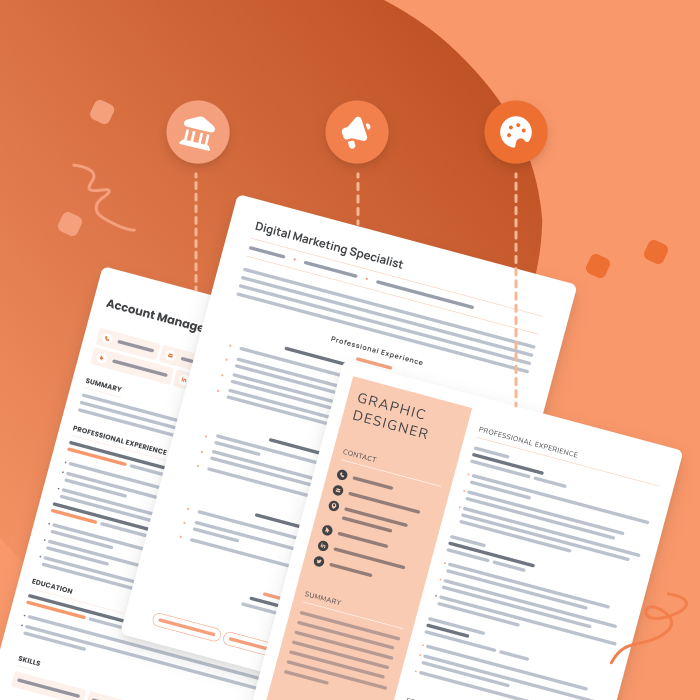
Resume examples for different industries
Not sure what your resume should look like? The best way to learn is by taking inspiration from resume examples written by other candidates in your industry.
1. Highlight them in your “Work Experience” section
If your extracurricular activities are extremely relevant to the type of work you’re aiming for, consider using them as examples of work experience on your resume. For instance, if you volunteered a lot in college and are writing a social work resume, outline that experience in your experience section.
Here’s what that might look like on your resume (notice how the formatting is the same as if it was actual work experience):

2. Include them in your “Education” section
If the extracurricular activity you want to put on your resume is loosely related to your degree, you can mention it in your resume’s education section. Even if you don’t elaborate much on the activity on your actual resume, it will intrigue the hiring manager and might even be conversation material for the interview.
Here’s a good example of an education section that effectively highlights an extracurricular activity:

3. Put them in an “Achievement” section
If the extracurricular activity you want to include on your resume involves a specific accomplishment or set of achievements, create an achievement section.
Depending on how relevant those accomplishments are to the job you want, you can place this section anywhere on your resume. However, we recommend placing this section at the bottom, to act as a nice final selling point of you as a candidate.
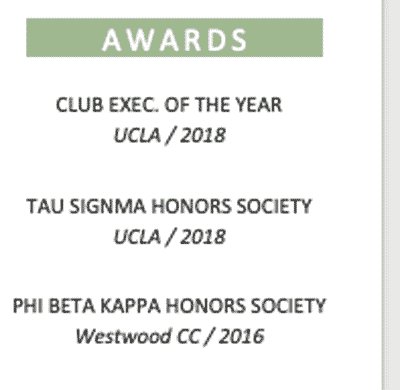
4. Fit them into your “Interests” section
If your extracurricular activities are important to who you are but they’re mostly irrelevant to the job, place them in an interests section on your resume.
Believe it or not, but hiring managers look for candidates with interesting personalities who they’d be happy working with 40 hours per week. If your extracurricular activities make you a more interesting candidate, don’t be afraid to mention them.
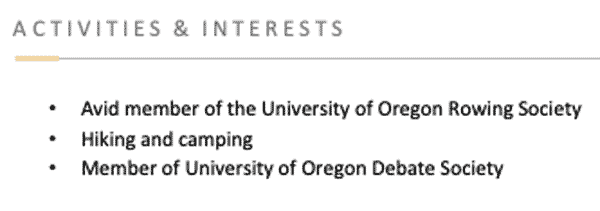
Click to rate this article
4.2 Average rating

